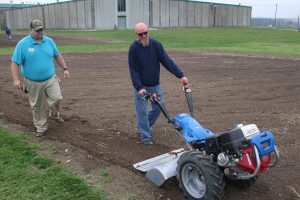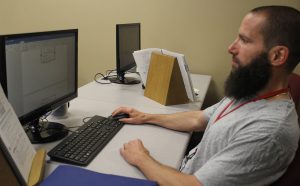Education programs encourage inmates to keep their noses clean, but get their hands dirty
August 2nd, 2019 by Ric Hanson
By Scott Stewart, Iowa Western Community College
CLARINDA – Frank Kinyon pushes a tiller through the ground, preparing it to become a small garden over the coming months. While this agrarian activity hardly seems out of place in rural Page County, it’s a relatively recent development inside the fence of the state-operated Clarinda Correctional Facility. The Clarinda prison launched a horticultural program several years ago that has blossomed into an apprenticeship. It has since added beekeeping to help inmates learn job skills while enjoying the peacefulness coming from spending time outside beyond working out in the yard. Iowa Western Community College partners with the Clarinda Correctional Facility, an all-male medium security prison, to offer a variety of classes, including the horticultural program. The college has several programs that can help support inmates once they’re released, too, so they can continue earning career credentials as they seek employment.

Inmate Fank Kinyon, right, pushes a tiller at the Clarinda Correctional Facility on April 23, 2019. The Clarinda prison launched a horticultural program several years ago that has blossomed into an apprenticeship. (Photo by Scott Stewart/Iowa Western Community College)
Kinyon, 48, is serving the last two years of a six-year mandatory sentence for a drug conviction. His wife works in landscaping, and he hopes to
join her and start his own small business once he’s released. He said he worked pouring concrete foundations for years, but it’s time for something different. “I think my back is done with that,” Kinyon said while taking a break from operating a tiller in the garden. “I need to look for something a little better, and this seems to be a lot better.” Kinyon has been working on the landscaping around the parking lot near the entrance to the prison, and he said there are plans to redo the flower beds and add some additional plants. He said he’s learning to tell which plants are appropriate for different climate zones and how to properly care for them. “I’ve always had a green thumb,” Kinyon said. “It’s something that drives a more positive outlook. Flowers make everybody happy.”
A study found that inmates who participate in educational programs are 43% less likely to return to prison and are 13% more likely to obtain employment after release. That’s why the Iowa Department of Corrections contracts with Iowa Western to provide quality education and vocational programs. “These guys come in with often very little education and our biggest hurdle is convincing them that they can learn,” said Lori Lastine, educational coordinator at Clarinda Correctional Facility. Brandon Feller, 32, said he’s learned a lot over the past few years working with the garden, and he also sees those skills as providing a foundation for himself when he’s released.
“I’ve got a family member who owns a greenhouse in Nebraska,” Feller said. “I think this helps a lot of guys because it makes you feel a little bit more at home than being in here. And it’s a learning thing, it keeps you busy, it keeps your mind busy. There’s always going to be greenhouse work when you get out, I mean always. There’s always something to do, and it’s a good job opportunity.”

Inmate Jason Fransene works in Microsoft Office during a computer class at the Clarinda Correctional Facility on April 23, 2019. The Clarinda prison offers a variety of educational programs to help inmates prepare for their release. (Photo by Scott Stewart/Iowa Western Community College)
Inmates at the Clarinda Correctional Facility have a variety of other educational programs through Iowa Western, including life skills, high school equivalency and computer software. Jason Fransene, 41, hopes to work in residential electrical installation when he is released. He’s taking a Microsoft Office 2016 class to learn how to prepare presentations, proposals and reports to customers and general contractors. Fransene said he’s learned some electrician skills while serving a sentence in another institution, and now he wants to learn how to market those skills to land a job. “What I’m doing now is trying to supplement that with self-studies and traditional classes,” Fransene said. “We have the ability to either improve ourselves if we choose or not to, and I am of the disposition that I would prefer to use my term wisely and learn skills that would allow me potentially to not come back.”
Fransene said he’s made a lot of mistakes, which he realizes as an older prisoner, but he believes the educational programs offer a path toward improving his life. He said he’s appreciated the shift in approach in recent years toward offering education programs aimed at re-entry into the community. “As I continue to advance my education through the opportunities in this institution, I believe that the skills learned will allow me to continue to make the proper decisions in the future,” Fransene said. David Stephens, an Iowa Western instructor assigned to the prison, said the horticulture program gives participants important lessons on responsibility and work ethic, on top of the subject-specific lessons.
“It gives guys a skillset in here that, when they’re released, there are more doors open,” Stephens said. “They can work landscaping jobs on the street with companies. Even if they get released in the winter, they can get on a snow removal team. Wineries are really big in Iowa right now, and there are opportunities that they can go to there.” The fresh produce grown at the prison is harvested at the end of the summer and fall. Inmates are allowed to buy it, and access to the produce is used as an incentive to encourage good behavior. “The guys who are in the class know that they have got to keep their noses clean,” Stephens said. “There’s not a lot of color in prison, so when you get some of that green, some of that fresh produce, it’s a big difference.” Lastine said the prison brings in offenders who need to earn their high school equivalence, but most of the educational programs are voluntary. Iowa Western runs the literacy and High School Equivalency Test programs, and the Microsoft Office class is a certificate program through the college, she said.
The horticulture program was started by the prison, and it has grown into a registered apprenticeship is through the U.S. Department of Labor, with Iowa Western overseeing classroom instruction, hydroponics and the gardens. Those successfully completing the registered apprenticeship can earn a certificate that they can use to land a job after release. About 40 to 50 inmates get their HiSET each year at the prison, Lastine said. Instruction for that program takes two full-time teachers, and the prison also has an employee for the horticulture and computer courses with one teacher. “We are able to impact the lives of these guys with a very small, very dedicated staff,” Lastine said.
Ultimately, programs like the garden and other educational opportunities provide a connection to the outside world and provide a positive experience that helps many inmates pass the time productively. “I just appreciate it,” Feller said. “We’re all trying to do better in our life. This is a great program to be in, and this a good thing that these guys need. This has helped a lot of us out.”
(Scott Stewart is a freelance journalist and communications consultant. This article was prepared on behalf of Iowa Western Community College’s Division of Economic and Workforce Development.)




